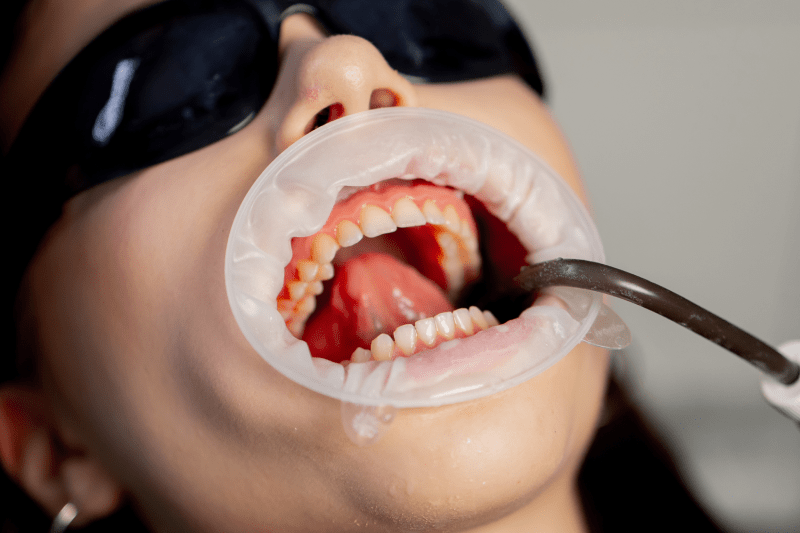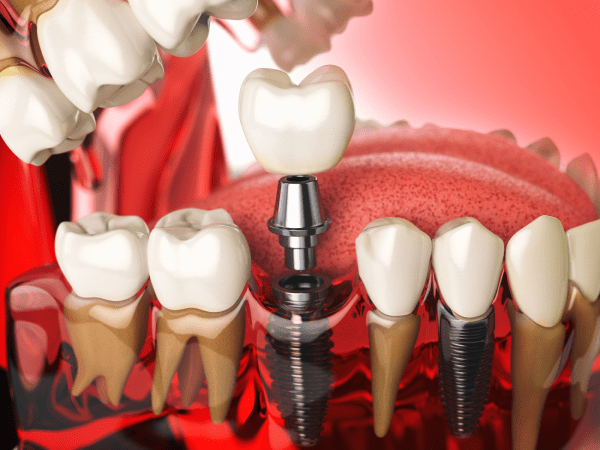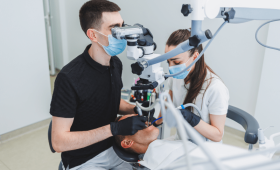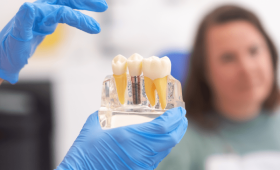How Does the Initial Consultation Process for Dental Implant Treatment Work?
Dental implant treatment in Turkey begins with a remote consultation from the patient’s home country. At this stage, the patient’s panoramic X-ray and intraoral photos are sent to the dentist. The dentist uses these images to make a preliminary assessment of the jawbone’s condition, tooth positions, and overall oral health. Based on this preliminary assessment, a draft treatment plan is created for the patient, and a price quote for the potential costs is provided. This process allows the patient to get comprehensive information about the treatment before traveling to Turkey.
Why is Jawbone Assessment Important in the First Stage of Treatment?
Jawbone assessment is a critical step for the success of dental implant treatment. Sufficient bone volume and density are essential for the implant to be placed stably. If the bone volume is insufficient, this may require an additional surgical procedure such as a bone graft or a sinus lift operation. Dentists use advanced imaging methods like 3D tomography to examine the jawbone in detail. This analysis ensures that the implant is placed at the correct size and angle and supports the long-term success of the treatment.
What is the First Step of the Dental Implant Operation?
The first step of the dental implant operation is numbing the surgical area under local anesthesia. This ensures that the patient does not feel any pain or discomfort during the procedure. Then, the dentist makes a small incision in the gum to reach the jawbone. A small hole is drilled in the area where the implant will be placed, using special surgical tools. This hole is prepared with precision to allow the implant to integrate with the bone.
How Long Does a Single Dental Implant Operation Take?
A single dental implant operation usually takes between 30 to 60 minutes to complete. The duration of the procedure can vary depending on the patient’s oral structure, the accessibility of the surgical area, and the dentist’s experience. If additional procedures such as a bone graft or a sinus lift are required during the operation, this time may be extended. Clinics in Turkey perform these procedures quickly and effectively thanks to modern equipment and experienced surgeons.
Is the Dental Implant Operation Painful?
The patient does not feel any pain during the dental implant operation because local anesthesia is applied. After the procedure, mild pain and swelling are normal. However, these symptoms can be easily controlled with prescribed painkillers and cold compresses. Post-operative pain is generally less than the pain experienced after a tooth extraction. Patients can return to their normal daily activities within a few days.
What Type of Anesthesia is Used in Implant Surgery?
The most common anesthesia method used in dental implant surgery is local anesthesia. Local anesthesia only numbs the area to be operated on, allowing the patient to remain conscious and communicate with the dentist. In some cases, sedation may also be applied to reduce the patient’s anxiety. Sedation relaxes the patient and makes them feel less stressed during the procedure.
What Are the Stages of Implant Treatment and How Long Does Each Stage Take?
Implant treatment usually consists of two or three main stages. The first stage is the surgical operation where the implant is placed into the jawbone. The second stage is the healing process (osseointegration), where we wait for the implant to fuse with the bone, which usually takes 3 to 6 months. In the third stage, an abutment and a prosthetic tooth are placed on the implant. In some cases, these processes can be combined with the “Same Day Implant” technique.
What is the Osseointegration Process and How Long Does It Take?
Osseointegration is the process where the implant biologically fuses with the jawbone. This process is vital for the implant to form a stable and solid foundation. The process usually takes 3 to 6 months, but it can vary depending on the patient’s overall health, bone density, and the area where the implant is placed. Careful care is required during this period for the implant to integrate successfully.
What is a Temporary Tooth and When is It Placed?
Temporary teeth are placed immediately after or shortly after the implant placement procedure to meet the patient’s aesthetic and functional needs. These teeth provide an aesthetic appearance until the osseointegration process is complete. Temporary teeth help you maintain your smile and eat and speak normally until the permanent teeth are placed.
What is a Sinus Lift Operation and in Which Cases is it Necessary?
Sinus lifting is a surgical procedure performed when there is not enough bone to place a dental implant in the upper jaw. The bottom part of the sinus cavity in the upper jaw is lifted upwards, and bone powder is placed in the created space. This way, sufficient bone volume is obtained for the placement of the implant. This procedure is usually performed by a specialist oral surgeon and is of critical importance for the success of the implant treatment.

What is a Bone Graft and How is It Applied?
A bone graft is a method applied when the jawbone is insufficient for dental implant placement. The graft can be obtained from the patient’s own body, synthetic materials, or animal-derived materials. The graft material is placed in the area of bone loss to encourage new bone formation. The healing process after this procedure can take several months before the implant is placed.
How is the Abutment Placement Stage Performed?
After the implant has fully integrated with the bone, a small connecting piece called an abutment is placed on the implant. This procedure is usually done with a small surgical operation under local anesthesia. The abutment acts as a bridge where the prosthetic tooth will be screwed or bonded onto the implant. This procedure is a critical step for the prosthetic tooth to take its final aesthetic and functional form.
How is the Healing Process Managed After Implant Surgery?
The healing process after implant surgery requires strict adherence to the dentist’s instructions. There may be swelling and mild pain for the first few days, so it is important to apply an ice pack and use painkillers. At the same time, avoiding hard foods and paying attention to oral hygiene also speeds up the healing process. Avoiding smoking and alcohol consumption is also of great importance for a successful recovery.
What are the Post-Implant Care Instructions?
Post-implant care is vital for extending the life of the implant. It is necessary to maintain oral hygiene by using special toothbrushes, interdental brushes, and dental floss as recommended by the dentist. Regular dental check-ups are also important to monitor the implant’s condition. These check-ups allow for the early detection of potential problems and guarantee the long-term success of the treatment.
Can One Eat Normally After Implant Surgery?
Immediately after implant surgery, it is recommended to eat soft foods for a few days. This prevents irritation of the surgical area and speeds up the healing process. As the pain and swelling subside, you can gradually return to your normal diet. Your dentist will give you clear instructions on when you can switch to a normal diet.
How is Oral Hygiene Maintained After Implant Surgery?
Oral hygiene after implant surgery should be maintained just like with natural teeth. It is important to brush twice a day, use dental floss, and use antibacterial mouthwash. Special interdental brushes are very useful for cleaning hard-to-reach areas around the implant. Good oral hygiene prevents inflammation around the implant and protects implant health.
What Are the Possible Risks and Complications of Dental Implant Surgery?
Although dental implant surgery is generally a safe procedure, it can carry some risks and complications. These include infection, damage to the sinus cavity, damage to adjacent teeth or nerves, and the failure of the implant to integrate with the jawbone (implant failure). These risks can be minimized with proper planning by an experienced dentist. Working with a professional intermediary agency like Cure Holiday reduces these risks.
What is Done in Case of a Failed Implant?
In case of a failed implant, the dentist usually removes the implant and waits for the area to heal for a while. After the healing is complete, it may be possible to place a new implant. The correct identification of the cause of the failure (e.g., infection or insufficient bone) and its elimination are vital for the success of the second attempt.
What is Full Mouth Restoration and How is It Done with Implants?
Full mouth restoration is a comprehensive treatment applied in cases where all or a large part of the teeth are missing. This treatment is usually performed by placing 4 or 6 implants (All-on-4, All-on-6) and fixing a full mouth prosthesis on these implants. This method allows the patient to fully regain their chewing function and aesthetics.
What is the All-On-4 or All-On-6 Technique?
The All-on-4 and All-on-6 techniques are methods of placing a fixed prosthesis in place of all teeth in the lower or upper jaw using only 4 or 6 implants. This technique usually makes it possible to place both the implants and the temporary prosthesis in a single day. This method is more economical than traditional implants because it requires fewer implants, and the healing process is shorter.
How Long Does Full Mouth Restoration Take?
The total duration of a full mouth restoration depends on the technique used and the patient’s condition. With same-day implant techniques like All-on-4, patients can get their temporary teeth in a single visit. However, the healing process required for the implants to fuse with the bone usually takes 3 to 6 months. Permanent prostheses are placed after this process is complete. Therefore, the total treatment process can take several months.
What is the Importance of Technology in Implant Surgery?
The use of technology in implant surgery increases the success of the treatment and the patient’s comfort. 3D tomography allows for a detailed examination of the jawbone’s structure and precise planning for placing the implant in the most suitable position. CAD/CAM technology enables the rapid and accurate production of prosthetic teeth. These technologies make the treatment process safer and more predictable.
How Are Appointments Scheduled for Patients from Abroad?
Clinics in Turkey make flexible appointment schedules that suit the travel plans of patients coming from abroad. Generally, initial consultations are conducted remotely. When the patient comes to Turkey for treatment, all procedures are arranged to fit their length of stay. This planning allows the treatment process to proceed smoothly and enables the patient to comfortably plan their holiday.

What is the Success Rate of Dental Implants in Turkey?
The success rate of dental implants in Turkey is in line with international standards and is generally over 95%. This high success rate is achieved through a combination of experienced dentists, advanced technology, and high-quality implant brands. Cases of failure are usually associated with patient factors such as smoking, uncontrolled diseases like diabetes, or poor oral hygiene.
Is There a Warranty Period for Dental Implants?
Many dental clinics in Turkey offer a warranty for the dental implants they place. This warranty period can vary depending on the implant brand used and the clinic’s policy. The warranty generally covers the free replacement of the implant if it breaks or fails within a certain period. It is important to get detailed information about the warranty conditions before starting the treatment.
How Many Visits to Turkey are Required for Implant Treatment?
A single visit to Turkey may be sufficient for implant treatment, but this depends on the treatment plan. If a simple implant placement procedure is to be done, patients can complete the implant placement on the first visit and return to their home country for the osseointegration process. Afterward, a second visit may be necessary for the crown placement. However, with methods like same-day implants, the procedure can be completed in a single visit.
What is the Total Treatment Duration?
The total duration of implant treatment varies according to the complexity of the treatment. In the simplest cases, placing the implant and the crown can take a few days. However, if additional procedures like a bone graft are required or if osseointegration needs to be waited for, the total duration can be 6 to 9 months. This duration ensures that every stage of the treatment is meticulously completed.
What is the Role of the Prosthesis in the Treatment?
The prosthesis (crown or bridge) is the final and most important step of the implant treatment. After the implant integrates with the bone, the prosthetic teeth are fixed onto the implant. These prostheses are specially designed and produced to fully mimic the appearance, function, and aesthetics of natural teeth. The quality of the prosthesis directly affects the long-term success of the treatment and the patient’s satisfaction.
Are the Crowns and Bridges Produced in Turkey High Quality?
Turkey is highly developed in dental technology and laboratory services. Crowns and bridges are produced with precision using the latest CAD/CAM systems. The materials used (zirconium, porcelain) are at international standards and are known for their durability. Therefore, the crowns and bridges produced in Turkey are of high quality both aesthetically and functionally.
What Are the Qualifications of Implant Surgeons in Turkey?
Implant surgeons in Turkey are individuals who have received dental education at universities and have completed specialization or special training programs in the field of implantology. Many of them attend international conferences and seminars to keep up with the latest developments. Working with an experienced surgeon increases the success rate of the treatment and the patient’s safety. Therefore, it is important to pay attention to the area of expertise when choosing a dentist.
How to Communicate with the Dentist During the Treatment Process?
There are different methods to communicate with the dentist during the treatment process. Especially for patients coming from abroad, clinics usually offer digital communication channels such as e-mail, WhatsApp, or video conferencing. This way, the patient can easily ask any questions they have before, during, and after the treatment. Many clinics also have English-speaking staff.
What is the Patient Experience Like During a Dental Holiday?
The patient experience during a dental holiday is not limited to just the treatment. Additional services such as airport transfers from the clinic, accommodation arrangements, and city tours make patients feel comfortable and safe. This process makes it possible to both receive successful treatment and explore the tourist attractions of Turkey.
Can Dental Treatment and a Holiday Be Combined?
Yes, dental treatment and a holiday can be easily combined in Turkey. Many cities are rich in both healthcare services and tourist attractions. Depending on the treatment, patients can explore the surroundings while resting during the recovery process. This combination allows patients to both regain their oral health and have an unforgettable experience.
How to Get Professional Support for the Entire Process?
Getting professional support throughout the entire process for dental implant treatment provides great convenience for patients. Health tourism agencies like Cure Holiday help patients find the most suitable clinic and dentist for their needs, organize appointments, and arrange accommodation and transfers. This service ensures that patients complete the entire process smoothly and safely.



